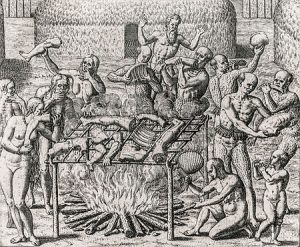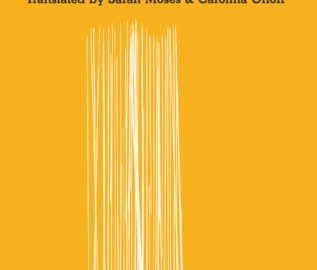Book: Tender is the Flesh is the second novel by Argentinian writer Agustina Bazterrica, and her first to be translated into English. It won the prestigious 2017 Clarín de Novela prize for a Spanish-language novel.


The smell of barbecue is in the air. They go to the rest area, where the farmhands are roasting a rack of meat on a cross. El Gringo explains to Egmont that they’ve been preparing it since eight in the morning, “So it melts in your mouth,” and that the guys are actually about to eat a kid. “It’s the most tender kind of meat, there’s only just a little, because a kid doesn’t weigh as much as a calf. We’re celebrating because one of them became a father,” he explains. “Want a sandwich?”
The impact of this paragraph changes drastically when you understand that the word ‘kid’ means ‘a human child’.

In the tradition of Brave New World, Never Let Me Go, The Handmaid’s Tale and the film Soylent Green (which it references), Bazterrica’s novel describes a near-future society which de-humanizes certain social groups in conventionally “unthinkable” ways in order to assure its own survival. Following a virus which has made all contact with animal flesh poisonous to humans, the meat industry has persuaded governments to legalize the breeding and slaughter of people. They are raised on breeding farms, genetically modified to speed their growth, carefully monitored by the Food Standards Agency. We learn more than we might wish to know about their slaughter and marketing, because our hero, Marcus, manages a slaughterhouse; he is also responsible for sales and distribution of so-called ‘special meat’. You may scoff at the science behind the “virus”; so does Marcus, who wonders if the whole affair was a government lie to solve overpopulation and its consequences. You may scoff at the idea that people would ever eat people: Marcus, who lived through the so-called “Transition”, recalls how society evolved to accept butchers selling ‘brochettes made of ears and fingers […] eyeball liquor […and] tongue a la vinaigrette’. You may comfort yourself that human flesh is cumulatively poisonous to humans, but Wikipedia reassures that this is not necessarily the case; that cannibalism is historically ubiquitous; and that most other species are getting on with it.
Accuracy: In all the clinically observed horror of industrialized cannibalism, the reader might forget that this book is equally about infertility and baby loss. Marcus is traumatized by both. He is separated from his wife, Cecilia, who left him when their infant son suffered a cot death. This was the final blow in a long chain of suffering: ‘ […] conversations about the possibility of adopting, phone calls to the bank, children’s birthday parties they wanted to escape, more hormones, chronic fatigue and more unfertilized eggs, tears, hurtful words, Mothers’ Days in silence, the hope for an embryo […], pregnancy texts thrown helplessly into the bin, fights, the search for an egg donor, questions about genetic identity, letters from the bank, the waiting, the fears, the acceptance that maternity isn’t a question of chromosomes, the mortgage, the pregnancy, the birth, the euphoria, the happiness, the death’. The themes of flesh-eating and baby loss merge vividly in a nightmare Marcus experiences, where ‘a wolf is eating some meat. Whenever he looks at the wolf, the animal raises its head and snarls. It bares its fangs. The wolf is eating something that’s moving, that’s alive. He looks closer. It’s his son, who’s crying but not making a sound’. Marcus experiences his grief so deeply that he is only able to break up and burn his son’s empty cot, months after the tragedy, on the day his life is turned upside down by the gift of a twenty-year-old purebred ‘female’.
Pregnant ‘females’ (meat stock are never referred to as men or women) are recognized as temperamentally different, and treated accordingly: they are often requested for game-hunts, because their condition makes them more ‘vicious’. At breeding farms, pregnant females have their limbs removed because they ‘otherwise kill their fetuses by ramming their stomachs against the bars of their cage, or by not eating, by doing whatever it takes to prevent their babies from being born and dying in a processing plant’. All females are artificially inseminated; any man who has sex with one of them is liable to be seized and sent to the slaughterhouse himself. We don’t experience the novel’s single labour scene in great deal, but when Marcus recognizes a crisis (‘the mattress is soaked with a brownish-green fluid’, implying fetal distress), it gets resolved with Call the Midwife-like celerity.
 Style: I can’t judge the style of the original Spanish, but translator Sarah Moses (who co-translated Harwicz’s Die, My Love, previously reviewed on this blog) has made her English version compulsively readable, keeping the novel’s few lyrical flights the right side of tendentious. I was particularly impressed by her lexical skills with naming cuts of meat.
Style: I can’t judge the style of the original Spanish, but translator Sarah Moses (who co-translated Harwicz’s Die, My Love, previously reviewed on this blog) has made her English version compulsively readable, keeping the novel’s few lyrical flights the right side of tendentious. I was particularly impressed by her lexical skills with naming cuts of meat.
Empathy: This book is all about empathy. With whom we empathize; when and why we cease to empathize; what defines humanity, and family. As Marcus reflects, ‘What do the workers [in the slaughterhouse] think about? Are they aware that what they hold in their hands was beating just moments ago? Do they care? Then he thinks that he actually spends most of his life supervising a group of people who, following his orders, slit the throats, gut, and cut up women and men as if doing so were completely natural. One can get used to almost anything, except the death of a child’.
The Pregnancy Test’s Verdict: Don’t read this book over a rare steak. Stick to Quorn (if you can find it).

